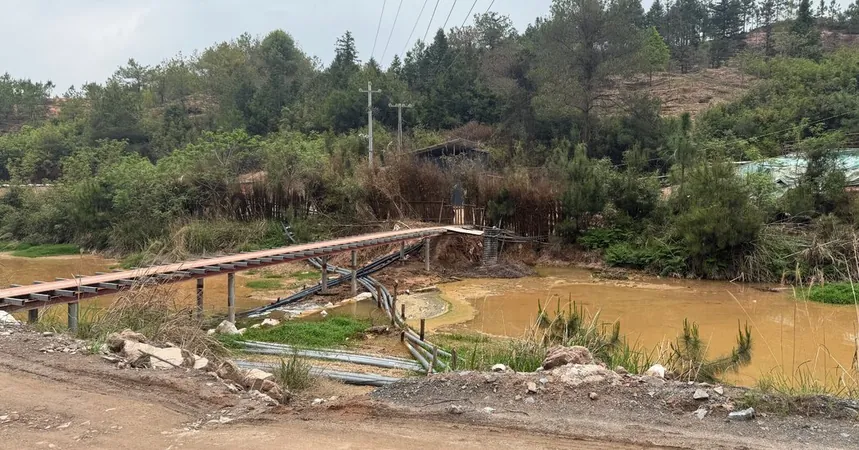
China's Bold Move: Rare Earth Exports Halted Amidst Escalating Trade Tensions
2025-04-13
Author: Wai
China's Export Ban on Vital Rare Earths Sends Shockwaves Globally
In a dramatic escalation of trade tensions, China has put a temporary halt on the export of essential minerals and magnets that are crucial to numerous industries, including automotive, aerospace, semiconductors, and defense. This move threatens to disrupt global supply chains, particularly for companies heavily reliant on these components.
Chinese authorities have blocked shipments of powerful magnets, pivotal for the manufacturing of everything from electric vehicles to advanced robotics and military missiles, as they work on a new regulatory framework. This system may restrict access to these crucial materials for various companies, specifically American defense contractors.
Retaliation Sparked by U.S. Tariffs
This crackdown is seen as China's countermeasure to increased tariffs imposed by the U.S. administration under President Trump, which began on April 2. Just two days later, the Chinese government announced restrictions on six types of heavy rare earth metals and rare earth magnets, which constitute an overwhelming 90% of the global production.
Under the new rules, these metals and magnets can only be exported with special licenses—a process that, according to industry leaders, is still in its infancy. This uncertainty is causing alarm among businesses that fear they may soon run out of necessary materials.
Implications for Key Industries
The suspension, if prolonged, could severely impact factories in Detroit and beyond, hampering the production of electric cars and other products reliant on rare earth magnets. Industries are bracing for unpredictable delays as companies vary widely in their reserve stocks.
Heavy rare earth metals are integral to the production of electric motors, which power everything from electric cars to military drones. Additionally, they find applications in critical technologies such as jet engines and artificial intelligence components.
Urgency for a Swift Resolution
Michael Silver, CEO of American Elements, anticipates a 45-day wait for the issuance of export licenses. He stated that his company had prepared for a trade war by stockpiling materials last winter, ensuring they can fulfill existing contracts during this chaotic period.
Other industry experts share concerns over the impact of these export controls, citing their potential to diminish China’s reputation as a reliable supplier. Daniel Pickard from the U.S. Trade Representative’s office emphasized the urgency of resolving this issue to prevent prolonged disruptions.
Military Supply Chain at Risk
James Litinsky, head of MP Materials—the only rare earths mine in the U.S.—pointed out that the halt in supplies is especially worrisome for military applications. As warfare increasingly incorporates drones and robotic technology, the lack of essential inputs could drastically affect operational readiness.
Japanese firms are faring somewhat better, having secured more than a year's supply of rare earths following a similar crisis back in 2010. In contrast, many American companies lack substantial inventories, choosing instead to avoid hefty cash ties in these critical materials.
China's Dominance in Rare Earths to Continue Unchecked
While rare earth magnets represent a small fraction of China's total exports, their absence can have a monumental impact on the U.S. and other countries due to their critical roles in various technologies.
Currently, Chinese customs are enforcing export bans not just on the U.S. but also impacting countries like Japan and Germany. The enforcement of these new measures is inconsistent, with various ports applying different levels of scrutiny to exports.
Future Uncertain: A Monopoly Under Threat?
Until recently, China produced a staggering 99% of the world’s heavy rare earth metals and 90% of rare earth magnets. With a monopolistic hold on these resources, any disruption could signal a shift in global supply chains. Most of China's rare earth operations are concentrated in Jiangxi Province, known for its rich deposits.
As the world watches closely, the continuation of these export restrictions could provoke further turmoil, reshaping international trade dynamics and pushing countries to seek alternative sources and solutions.




 Brasil (PT)
Brasil (PT)
 Canada (EN)
Canada (EN)
 Chile (ES)
Chile (ES)
 Česko (CS)
Česko (CS)
 대한민국 (KO)
대한민국 (KO)
 España (ES)
España (ES)
 France (FR)
France (FR)
 Hong Kong (EN)
Hong Kong (EN)
 Italia (IT)
Italia (IT)
 日本 (JA)
日本 (JA)
 Magyarország (HU)
Magyarország (HU)
 Norge (NO)
Norge (NO)
 Polska (PL)
Polska (PL)
 Schweiz (DE)
Schweiz (DE)
 Singapore (EN)
Singapore (EN)
 Sverige (SV)
Sverige (SV)
 Suomi (FI)
Suomi (FI)
 Türkiye (TR)
Türkiye (TR)
 الإمارات العربية المتحدة (AR)
الإمارات العربية المتحدة (AR)